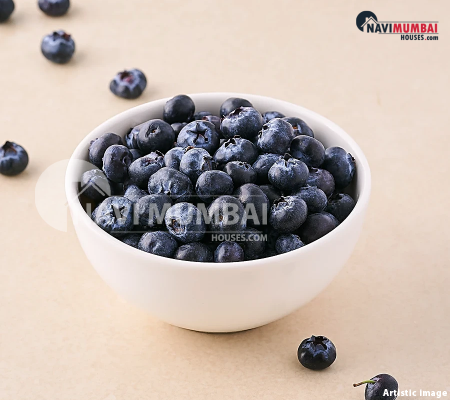
Introduction: The Heart of the Matter
It’s not every day that cardiologists collectively recommend one fruit as a must-have for daily heart health. But in recent months, blueberries have captured the spotlight in India’s nutrition and medical circles. Known as one of the most powerful superfoods, blueberries are praised for lowering blood pressure, improving cholesterol, and even slowing the signs of aging arteries.
However, there’s one challenge: the price tag. Imported blueberries can cost anywhere between ₹1,000–₹1,800 per kg — a luxury for most Indian households. Yet, experts say there are smart, affordable ways to get the same heart-protective benefits.
Why Cardiologists Are Recommending Blueberries
Blueberries are packed with anthocyanins, a type of flavonoid that gives the fruit its rich blue-purple color and strong antioxidant power. These compounds help reduce inflammation and protect the lining of blood vessels — both critical for heart health.
“Regular consumption of blueberries helps improve arterial flexibility, lowers bad cholesterol (LDL), and boosts good cholesterol (HDL). For patients with early signs of heart disease or diabetes, even 50 grams a day can make a measurable difference.”
Other benefits include:
-
Improved insulin sensitivity — helpful for diabetics.
-
Reduced oxidative stress, which can slow plaque buildup.
-
Support for brain health and memory, thanks to antioxidants.
In simpler terms: if you eat blueberries daily, your arteries stay younger for longer.
But Why Are Blueberries So Expensive in India?
The reason lies in logistics and climate. Blueberries don’t naturally grow in most Indian climates; they’re imported mainly from the U.S., Peru, or parts of Europe.
Add to that the costs of refrigeration, packaging, and transport — and what’s a $3 fruit abroad becomes ₹700 for a small 125g pack here.
Retailers often sell them as a luxury item, and the price spikes further during off-season months (March–July). Even with domestic farming attempts in Himachal Pradesh and Meghalaya, production remains limited.
Affordable Indian Alternatives with Similar Benefits
If you can’t add blueberries to your grocery list, don’t worry — nature has provided several desi alternatives with similar health benefits at a fraction of the cost.
| Indian Alternative | Key Benefits | Approx. Price (per kg) |
|---|---|---|
| Jamun (Java Plum) | High in anthocyanins, controls blood sugar | ₹120–₹150 |
| Black Grapes | Antioxidant-rich, good for cholesterol | ₹100–₹180 |
| Amla (Indian Gooseberry) | Boosts vitamin C, detoxifies liver, supports heart | ₹80–₹100 |
| Mulberries (Shahtoot) | Supports blood flow, aids digestion | ₹150–₹200 |
| Pomegranate | Improves circulation, antioxidant-dense | ₹120–₹200 |
| Blueberry Seeds / Dried Blueberries (Indian brands) | Long shelf life, cheaper bulk option | ₹400–₹600 |
The Smart Way: Affordable Blueberry Nutrition
If you still want authentic blueberry benefits without spending a fortune, consider three practical options:
-
Buy Frozen or Dried Blueberries
Frozen packs (₹400–₹600) preserve most nutrients and can be stored for months. Add them to smoothies or yogurt. -
Blueberry Seed Supplements
Blueberry seed powder or capsules are emerging in India. They deliver antioxidants similar to fresh berries at a much lower cost. -
Mix-and-Match Smoothies
Combine a handful of black grapes, jamun, or amla with one spoon of blueberry seed powder — a perfect balance of taste and nutrition.
What Most Dieters Overlook
The 48-year-old woman mentioned in The Indian Express report learned the hard way that “eating right” isn’t always the same as eating smart.”
Despite walking daily and following a strict diet, her blood sugar stayed high — until doctors pointed out she was missing polyphenols and flavonoids that improve insulin sensitivity.
Blueberries — and their Indian counterparts — are precisely what fill this nutritional gap.
Conclusion:
Cardiologists agree — daily fruit intake can transform heart health, and blueberries top that list. But affordability shouldn’t stop you from getting those same benefits. Whether you choose jamun, amla, or black grapes, the key lies in consistency, diversity, and awareness.
In the end, it’s not just about expensive superfoods — it’s about making super habits part of your lifestyle.
Visit Us: Navimumbaihouses.com or Call Us @ 8433959100
The post “Blueberries for Heart Health: Experts Urge Daily Intake, Yet Price Pains Persist. Smart Swaps Inside.” appeared first on .

